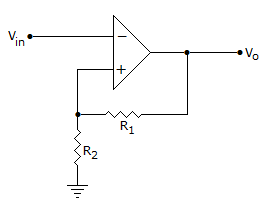ECE :: Analog Electronics
-
The theoretical maximum efficiency of a half wave diode rectifier is
-
Which of the following statement is correct?
-
In a transistor push pull amplifier
-
When negative feedback is used the fractional changes in closed loop gain are desensitized by the factor (1 + Avβ)
-
Which of the following statement about JFET is true?
-
Which of the following is the common feature between FETs and bipolars?
-
The circuit shown in the figure is that of

-
The current through common emitter resistor of a differential amplifier is called
-
V MOS have the advantage of
|
A.
The input impedance of CE amplifier is usually around 10 Ω
|
|
B.
The voltage gain of a transistor amplifier in CE mode is always less than unity
|
|
C.
The output impedance of a transistor amplifier is independent of the transistor configuration
|
|
D.
The voltage gain of a transistor amplifier is independent of the load resistance
|
|
A.
In a JFET, gate and source have opposite polarity with respect to drain irrespective of the type of FET
|
|
B.
In its schematic symbol for JFET, the arrow always points to p-type material
|
|
C.
In an n-channel JFET, the channel is the narrowest under zero gate bias condition
|
|
D.
In JFET, gate source cut off voltage is numerically equal to the pinch off voltage
|


 Whatsapp
Whatsapp
 Facebook
Facebook

